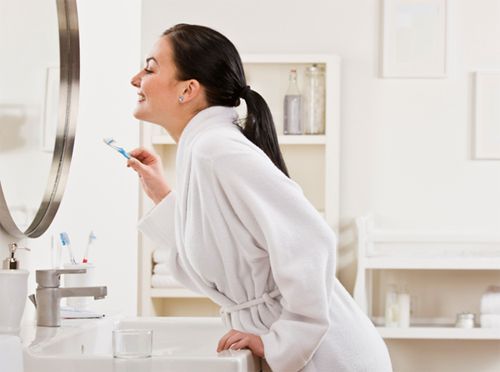Everyone knows that basic dental hygiene includes brushing your teeth and flossing before bed every night. In fact, most dental professionals recommend you brush and floss twice a day. But is that all that’s really needed to ensure a healthy set of teeth? Proper dental care requires a bit more maintenance. Follow these dental care tips to make sure your teeth are in tip-top shape before your next visit to the dentist.
Upgrade your toothbrush
Time to trade in your old toothbrush! Dentists today recommend switching to an electric toothbrush to ensure a thorough cleaning. Electric toothbrushes have a combination of rotation and oscillating bristle movements, which allow them to remove plaque from teeth more thoroughly and efficiently than traditional brushes. It is also recommended that you replace the toothbrush head every three months or so—sooner if the bristles become soft or frayed.
Use the right brushing methods
It’s not enough to just run a toothbrush over your teeth. Rather, there are proper brushing procedures to ensure an efficient cleaning that is also gentle on your teeth and gums. You should hold the brush at a 45-degree angle from your gums, and use short strokes about tooth-wide. Move the toothbrush head in a circular motion instead of back and forth, as this is easier on gums and prevents wear. Make sure to brush the outer, inner and chewing surfaces of your teeth, and don’t neglect your tongue! Brush that as thoroughly as your teeth because bacteria can live and grow there, contributing to bad breath and overall harmful bacteria levels in the mouth.
Don’t forget to floss properly
Flossing is the most reliable way to keep plaque off teeth and maintain gum health. Flossing doesn’t have to be done just at night, although it should absolutely be part of your nightly routine. Ideally, you should floss after every meal to get food particles out from teeth and prevent decay. Flossing, as well as brushing, has a proper method. The American Dental Hygienists’ Association recommends using 18 inches of floss wrapped around your middle fingers, leaving about 2 inches between fingers. Make sure the floss is taut and use your index fingers to gently guide it, bending it around the sides of your teeth. Slide the floss up and down the sides of every tooth, unraveling new sections of the floss for each tooth.
Include mouthwash in your nightly routine
Mouthwash isn’t just for keeping your breath minty-fresh. Mouthwashes contain a variety of ingredients that are beneficial to your teeth as well. Some examples include fluoride for strengthening teeth; periofine, which dissolves plaque and tartar; and listerine, which helps kill plaque and bacteria. Over-the-counter mouthwashes tend to contain too much alcohol, which can actually dry your mouth out, so talk to your dentist about getting a mouthwash that has the right ingredients for your oral health.
Keep water by your bed
This may not seem like a normal nightly dental tip, but it can be beneficial to oral health. Saliva is a naturally occurring, plaque-fighting substance in the mouth that dries up at night. Having water on hand can keep your mouth from becoming dehydrated, helping avoid plaque buildup on teeth and fending off gum deterioration.
No matter how thorough your bedtime routine, make sure you see your dentist for health checks and cleaning regularly—about every six months. This plus the dental tips above will keep your pearly whites smile-ready and your mouth healthy!


